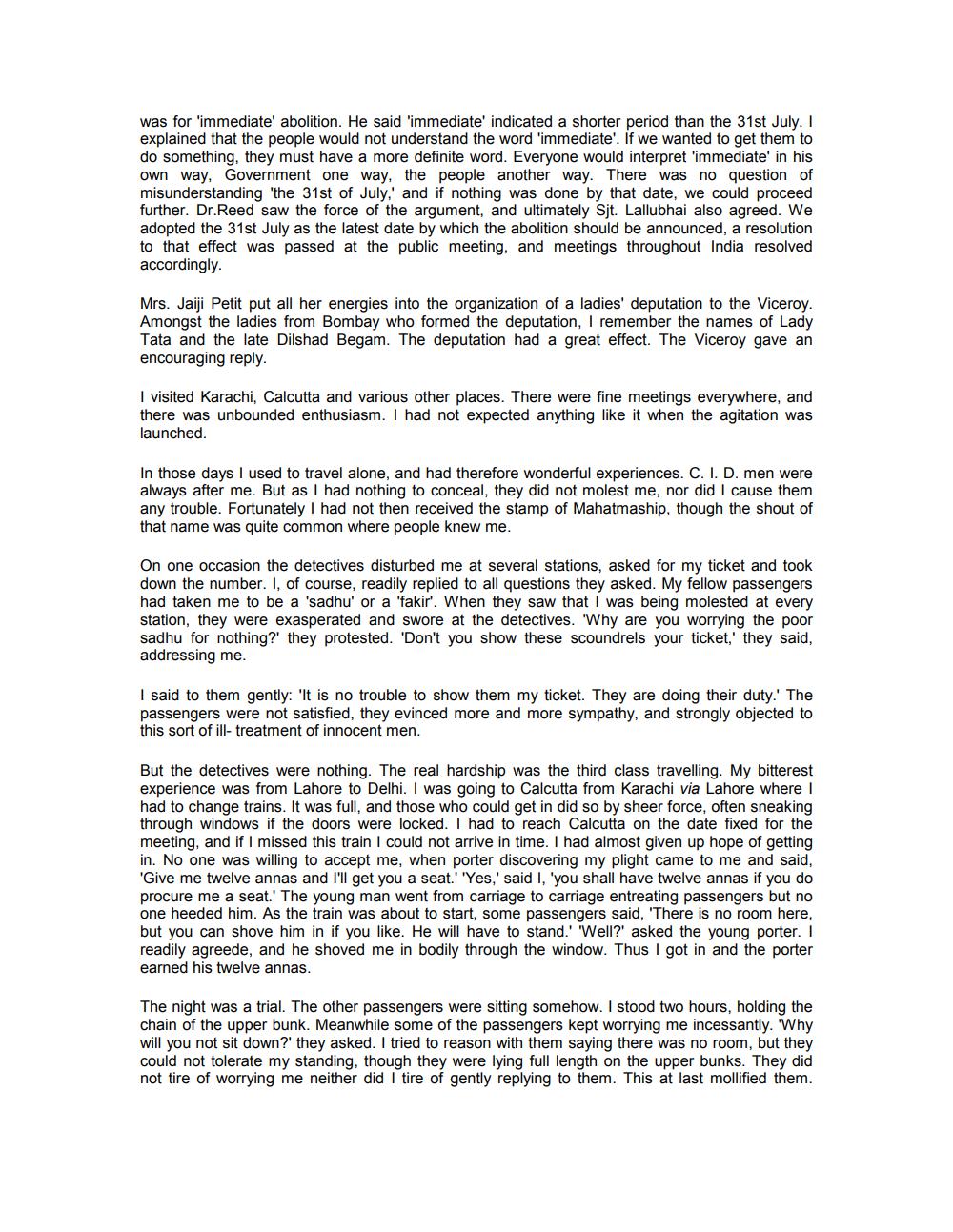________________
was for 'immediate' abolition. He said 'immediate indicated a shorter period than the 31st July. I explained that the people would not understand the word 'immediate'. If we wanted to get them to do something, they must have a more definite word. Everyone would interpret 'immediate' in his own way, Government one way, the people another way. There was no question of misunderstanding the 31st of July,' and if nothing was done by that date, we could proceed further. Dr. Reed saw the force of the argument, and ultimately Sjt. Lallubhai also agreed. We adopted the 31st July as the latest date by which the abolition should be announced, a resolution to that effect was passed at the public meeting, and meetings throughout India resolved accordingly.
Mrs. Jaiji Petit put all her energies into the organization of a ladies' deputation to the Viceroy. Amongst the ladies from Bombay who formed the deputation, I remember the names of Lady Tata and the late Dilshad Begam. The deputation had a great effect. The Viceroy gave an encouraging reply.
I visited Karachi, Calcutta and various other places. There were fine meetings everywhere, and there was unbounded enthusiasm. I had not expected anything like it when the agitation was launched.
In those days I used to travel alone, and had therefore wonderful experiences. C. I. D. men were always after me. But as I had nothing to conceal, they did not molest me, nor did I cause them any trouble. Fortunately I had not then received the stamp of Mahatmaship, though the shout of that name was quite common where people knew me.
On one occasion the detectives disturbed me at several stations, asked for my ticket and took down the number. I, of course, readily replied to all questions they asked. My fellow passengers had taken me to be a 'sadhu' or a 'fakir'. When they saw that I was being molested at every station, they were exasperated and swore at the detectives. "Why are you worrying the poor sadhu for nothing?' they protested. 'Don't you show these scoundrels your ticket,' they said, addressing me.
I said to them gently: 'It is no trouble to show them my ticket. They are doing their duty.' The passengers were not satisfied, they evinced more and more sympathy, and strongly objected to this sort of ill-treatment of innocent men.
But the detectives were nothing. The real hardship was the third class travelling. My bitterest experience was from Lahore to Delhi. I was going to Calcutta from Karachi via Lahore where I had to change trains. It was full, and those who could get in did so by sheer force, often sneaking through windows if the doors were locked. I had to reach Calcutta on the date fixed for the meeting, and if I missed this train I could not arrive in time. I had almost given up hope of getting in. No one was willing to accept me, when porter discovering my plight came to me and said, 'Give me twelve annas and I'll get you a seat.' 'Yes,' said I. 'you shall have twelve annas if you do procure me a seat.' The young man went from carriage to carriage entreating passengers but no one heeded him. As the train was about to start, some passengers said, 'There is no room here, but you can shove him in if you like. He will have to stand.' 'Well?' asked the young porter. I readily agreede, and he shoved me in bodily through the window. Thus I got in and the porter earned his twelve annas.
The night was a trial. The other passengers were sitting somehow. I stood two hours, holding the chain of the upper bunk. Meanwhile some of the passengers kept worrying me incessantly. "Why will you not sit down?' they asked. I tried to reason with them saying there was no room, but they could not tolerate my standing, though they were lying full length on the upper bunks. They did not tire of worrying me neither did I tire of gently replying to them. This at last mollified them.




